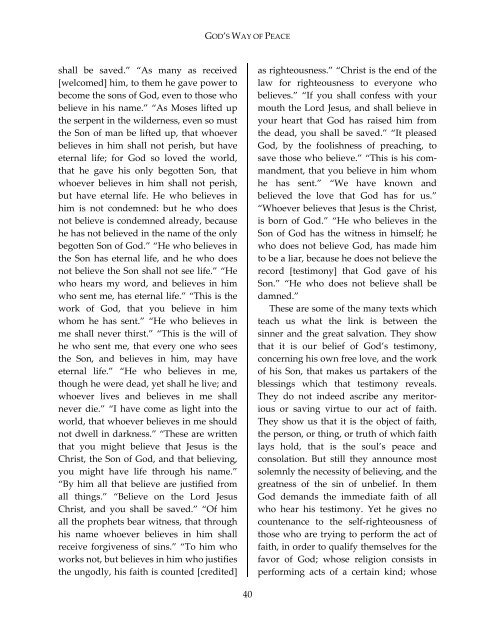God's Way of Peace by Horatius Bonar, D.D.
The seasoned Scottish pastor wrote this short devotional for those suffering from guilt, anxiety, or the consequences of sin. He writes with neither chastisement nor condemnation, but rather immediately directs his readers to Christ’s gift of salvation through his death and resurrection. Bonar reminds all that the Gospel offers hope for the sinner and comfort for the troubled, for God’s perfect, constant grace never fails those who accept it. From Bonar’s time to the present, people have found peace with God afresh through this book. Many people report having read it several times, and turning to it again and again when troubles arise. Kathleen O’Bannon CCEL Staff
The seasoned Scottish pastor wrote this short devotional for those suffering from guilt, anxiety, or the consequences of sin. He writes with neither chastisement nor condemnation, but rather immediately directs his readers to Christ’s gift of salvation through his death and resurrection. Bonar reminds all that the Gospel offers hope for the sinner and comfort for the troubled, for God’s perfect, constant grace never fails those who accept it. From Bonar’s time to the present, people have found peace with God afresh through this book. Many people report having read it several times, and turning to it again and again when troubles arise.
Kathleen O’Bannon
CCEL Staff
Create successful ePaper yourself
Turn your PDF publications into a flip-book with our unique Google optimized e-Paper software.
GOD’S WAY OF PEACE<br />
shall be saved.” “As many as received<br />
[welcomed] him, to them he gave power to<br />
become the sons <strong>of</strong> God, even to those who<br />
believe in his name.” “As Moses lifted up<br />
the serpent in the wilderness, even so must<br />
the Son <strong>of</strong> man be lifted up, that whoever<br />
believes in him shall not perish, but have<br />
eternal life; for God so loved the world,<br />
that he gave his only begotten Son, that<br />
whoever believes in him shall not perish,<br />
but have eternal life. He who believes in<br />
him is not condemned: but he who does<br />
not believe is condemned already, because<br />
he has not believed in the name <strong>of</strong> the only<br />
begotten Son <strong>of</strong> God.” “He who believes in<br />
the Son has eternal life, and he who does<br />
not believe the Son shall not see life.” “He<br />
who hears my word, and believes in him<br />
who sent me, has eternal life.” “This is the<br />
work <strong>of</strong> God, that you believe in him<br />
whom he has sent.” “He who believes in<br />
me shall never thirst.” “This is the will <strong>of</strong><br />
he who sent me, that every one who sees<br />
the Son, and believes in him, may have<br />
eternal life.” “He who believes in me,<br />
though he were dead, yet shall he live; and<br />
whoever lives and believes in me shall<br />
never die.” “I have come as light into the<br />
world, that whoever believes in me should<br />
not dwell in darkness.” “These are written<br />
that you might believe that Jesus is the<br />
Christ, the Son <strong>of</strong> God, and that believing,<br />
you might have life through his name.”<br />
“By him all that believe are justified from<br />
all things.” “Believe on the Lord Jesus<br />
Christ, and you shall be saved.” “Of him<br />
all the prophets bear witness, that through<br />
his name whoever believes in him shall<br />
receive forgiveness <strong>of</strong> sins.” “To him who<br />
works not, but believes in him who justifies<br />
the ungodly, his faith is counted [credited]<br />
as righteousness.” “Christ is the end <strong>of</strong> the<br />
law for righteousness to everyone who<br />
believes.” “If you shall confess with your<br />
mouth the Lord Jesus, and shall believe in<br />
your heart that God has raised him from<br />
the dead, you shall be saved.” “It pleased<br />
God, <strong>by</strong> the foolishness <strong>of</strong> preaching, to<br />
save those who believe.” “This is his commandment,<br />
that you believe in him whom<br />
he has sent.” “We have known and<br />
believed the love that God has for us.”<br />
“Whoever believes that Jesus is the Christ,<br />
is born <strong>of</strong> God.” “He who believes in the<br />
Son <strong>of</strong> God has the witness in himself; he<br />
who does not believe God, has made him<br />
to be a liar, because he does not believe the<br />
record [testimony] that God gave <strong>of</strong> his<br />
Son.” “He who does not believe shall be<br />
damned.”<br />
These are some <strong>of</strong> the many texts which<br />
teach us what the link is between the<br />
sinner and the great salvation. They show<br />
that it is our belief <strong>of</strong> God’s testimony,<br />
concerning his own free love, and the work<br />
<strong>of</strong> his Son, that makes us partakers <strong>of</strong> the<br />
blessings which that testimony reveals.<br />
They do not indeed ascribe any meritorious<br />
or saving virtue to our act <strong>of</strong> faith.<br />
They show us that it is the object <strong>of</strong> faith,<br />
the person, or thing, or truth <strong>of</strong> which faith<br />
lays hold, that is the soul’s peace and<br />
consolation. But still they announce most<br />
solemnly the necessity <strong>of</strong> believing, and the<br />
greatness <strong>of</strong> the sin <strong>of</strong> unbelief. In them<br />
God demands the immediate faith <strong>of</strong> all<br />
who hear his testimony. Yet he gives no<br />
countenance to the self‐righteousness <strong>of</strong><br />
those who are trying to perform the act <strong>of</strong><br />
faith, in order to qualify themselves for the<br />
favor <strong>of</strong> God; whose religion consists in<br />
performing acts <strong>of</strong> a certain kind; whose<br />
40

















